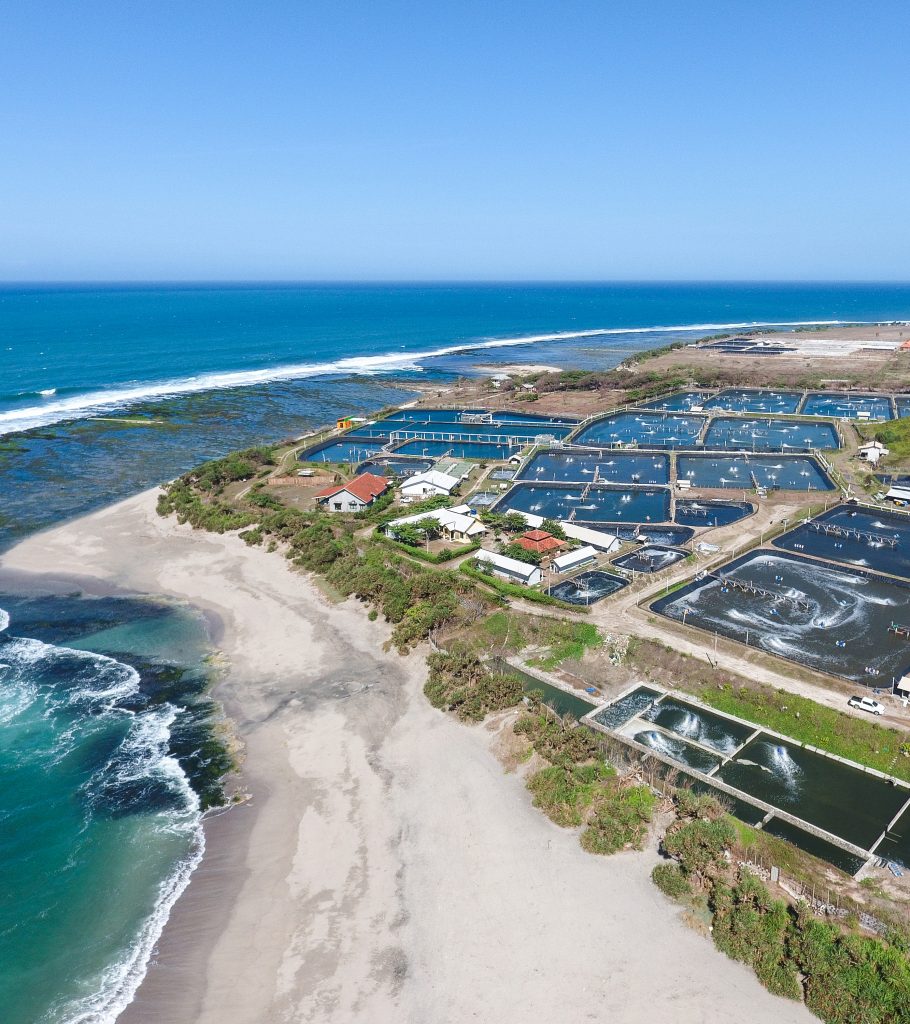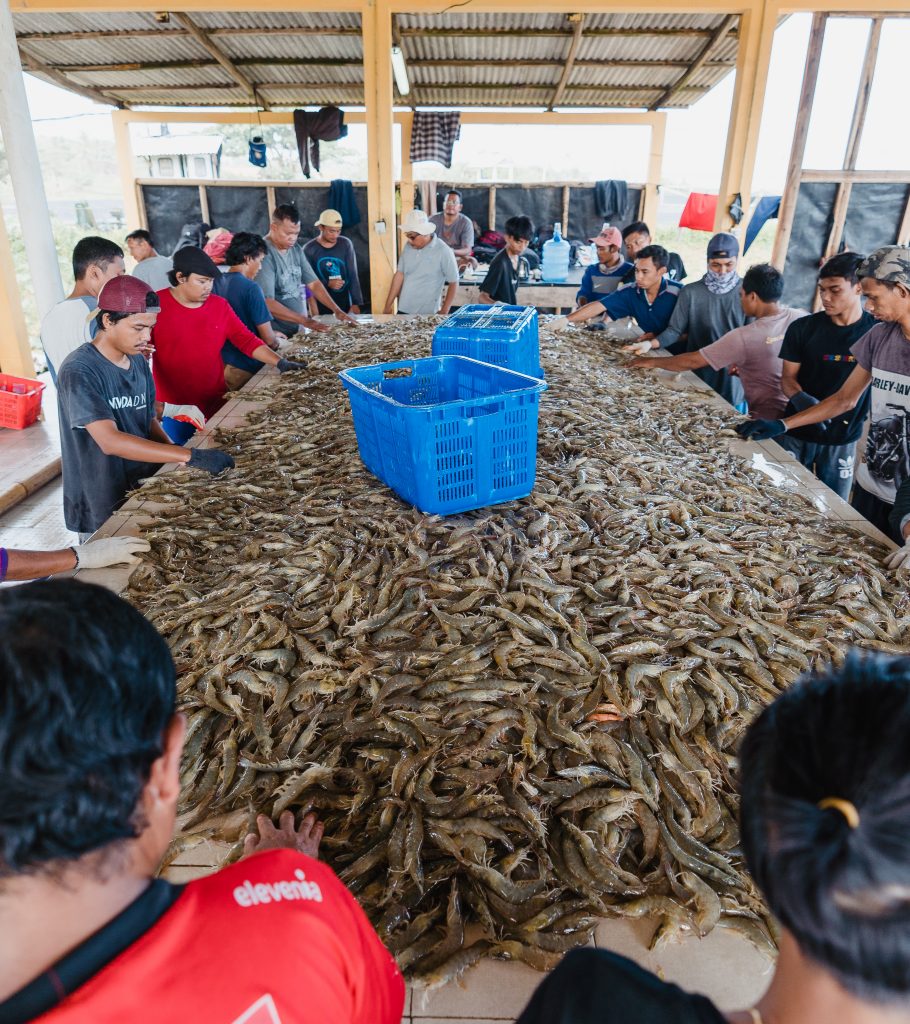Science as the Root of Innovation, DELOS Story Encourages Competitive Shrimp Farmers
DELOS introduces “Blue Revolution”, a way to develop and modernize Indonesian aquaculture technology to be able to compete on a global scale
Struggle for digitalization in the aquaculture industry continue to be encouraged by many parties. In the midst of its tantalizing potential, according to Food and Agriculture Organisation, Indonesia is ranked 2nd out of the top 10 countries for aquaculture production, but many upstream to downstream processes are carried out manually. These constraints affect the running of the cultivation production process in this country.
Guntur Mallarangeng, Bobby Indra Gunawan, Alexander Farthing, and Aristya Noerhadi, with multidisciplinary backgrounds including aquaculture, marine science and microbiology, as well as technology and entrepreneurship; decided to complete the challenge. Then DELOS was born in November 2021. DELOS introduced the “Blue Revolution” mission, which is a way to develop and modernize Indonesian aquaculture technology to be able to compete with similar players on a global scale.
OF THE focus on shrimp farming because it is the largest and most valuable marine commodity in Indonesia. Based on data quoted by DELOS, shrimp farming is a large but not optimal industry. The value of its exports in Indonesia is currently in the range of $2-2,5 billion, this figure should be at least $4-5 billion per year because Indonesia has a coastline, climate and people that are hard to beat.
“Why is Indonesia's maritime cultivation industry, which amounts to billions of USD per year, still lagging behind other countries? The answer to this question is interesting, because it is both simple and complex. "Simply put, not many farmers have the financial capacity to invest in cultivation technology or technical understanding of cultivation technology, so they end up being left behind by farmers in other countries," said Guntur to DailySocial.id.
He continued, the more complicated answer is related to systemic problems. When viewed from a macro perspective, these problems stem from the lack of development and application of aquaculture science in Indonesia; lack of financial inclusion in the aquaculture industry; lack of adoption of the latest technology in the aquaculture industry; and the lack of skilled workers and developed expertise in the aquaculture industry.
"The combination of the four points above are the factors that influence the lack of progress in our aquaculture industry. "The lack of financial inclusion from our country's financial institutions contributes to the lack of investment that can be obtained by the aquaculture industry, thus making the price of innovation, even long-term investment, unaffordable," he continued.
Guntur said, "This lack of investment makes the training and development of experts very slow, even insufficient for industrial development targets. The lack of expertise and investment makes it difficult to accelerate research, scientific development and application, and technology adoption.”

DELOS Solutions
Guntur explained that science is the root of the aquaculture industry because it has a long process of making new discoveries and turning these discoveries into something that can be applied in the field. In carrying out this process, DELOS adopted a slightly different perspective in introducing technology to shrimp farmers.
"We think of a farm as a computer, then we can see that the farm will need it hardware and for mobile devices to report the. In addition, the pond requires Update so that existing technology can be even better. DELOS' productivity increasing technology is called Aquahero, a product whose aim is to improve the welfare and competitiveness of Indonesian farmers."
Aquahero is powered by a predictive algorithm called PrawnHub Engine (PH Engine). The machine is being programmed so that it can use hundreds to thousands of hectares of ponds that the company has managed as a dataset. The dataset will be digested by machines so that DELOS can provide operational recommendations to farmers.
"Moreover, we also install SOPs that we have researched into our partner farms, so that they can use the latest and most updated SOPs, which have been proven to increase productivity. This is all accompanied by the expert DELOS team, full-time, to supervise and guide our partner farms.”
Meanwhile, in terms of hardware, there are several infrastructure installation points that already exist and must be installed. For example, IoT like auto-feeders, water sanitation, waste processing, and laboratories so that water quality is maintained. DELOS also continues to update this technology by researching prices Capex can be reduced and prices are more affordable.
"We have started research on shrimp genetics and shrimp diseases (viruses and bacteria) so that we can start making disease testing processes and tools faster and cheaper, so that they can reach all farmers in Indonesia. We are also working with financial institutions to make financial access easier for our farm partners.”
Apart from productivity, DELOS also helps address supply chains that are integrated into foreign markets and access to finance is still a fundamental problem for the Indonesian aquaculture industry. Through the AquaLink solution, it allows shrimp farmers and suppliers to facilitate the sale of their harvest at the best price and payment system.
The next challenge that DELOS will answer is financial access and capital difficulties experienced by many independent farmers. Because many farmers are forced to use money from their own pockets as business capital. This is a big obstacle because many farmers do not have a backup plan if their shrimp farms do not produce profits.
Through AquaBank, DELOS provides funding services that are equipped with risk assessment and unique needs for each farm and its owner. In this way, farmers can be helped to achieve success.
Guntur continued, each product and service has a strategy to market (GTM) and timeline different ones. All of this is again rooted in science. Science has a long process of making new discoveries and turning those discoveries into something that can be applied in the field.
He also believes that through collaboration with many farmers and laboratories throughout Indonesia, DELOS is optimistic that its solutions which are currently in research trials can be applied in the next one to two years, especially those that are SOP-based and require large datasets.
“For things that are genetic, it might take a little longer. However, we believe that these scientific breakthroughs must be implemented and implemented, so that Indonesia can become a world leader in maritime cultivation."

Next plan
Apart from business, DELOS also pays great attention to the development of human resources in the aquaculture industry. His party will establish the DELOS Maritime Institute (DMI) in Yogyakarta as a training center with a world-class curriculum and field practice, to create a new generation ready to work in the aquaculture field as pond managers, technicians, laboratory assistants and field officers.
Apart from that, DMI will also become a center for scientific and technological research in the field of aquaculture, including early detection and prevention of livestock diseases as well as pond infrastructure innovation. "The education process is quite long, but we have prepared a team to take care of each farmer partner. "We liken the pond to a school and a big lab, so the learning process never stops."
It is claimed, since it first started operating until now, DELOS is on track to support 100 hectares of intensive and super-intensive shrimp ponds in the near future. Requests from various regions to visit DELOS are also booming.
“More than 600 hectares of ponds are still waiting for DELOS's touch. "We really want to encourage Indonesia to realize that our vast oceans have great potential to become a source of power for a large and sustainable national economy."
In running his business, Guntur admitted that DELOS has a fairly simple business philosophy: value and value capture. For create value, or creating added value, in the aquaculture industry by increasing overall industrial production output.
In addition, his party will start looking for profits when the industry feels the positive impact of DELOS' operations and contributions. All solutions offered are collaborative in nature. “All of our farms partner with us, whether it's productivity improvement solutions, solutions supply chain leaders, or solution financing. What we are trying to build is trust and long-term working relationships.”
Sign up for our
newsletter
 Premium
Premium
